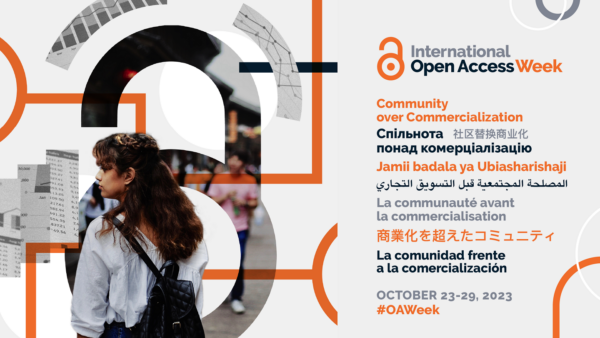International Open Access Week 2023 is October 23-29. This year’s theme, “Community over Commercialization”, encourages conversation about which approaches to open scholarship prioritize the best interests of the public and the academic community. OA Week is an invaluable chance to connect the global momentum toward open sharing with the advancement of policy changes on the local level. Universities, colleges, research institutes, funding agencies, libraries, and think tanks have used Open Access Week as a platform to host faculty votes on campus open-access policies, to issue reports on the societal and economic benefits of Open Access, to commit new funds in support of open-access publication, and more.
Cornell University Library is hosting events all week on Zoom. Please click on the links below for more information:
Variations on a Theme: Alternatives to Article Processing Charges (APCs)
Monday, 10/23, 1 to 2pm
mong commercial publishers, Article Processing Charges (APCs) cover publishing costs and make it possible for articles to be published as Open Access (OA). But what other options exist, particularly when APCs can reach up to $11,000 per article? Other options do exist, such as Diamond OA, where all costs are borne by the publisher and the author is not required to pay any APCs; Subscribe to Open, where no payment is associated with an article, but instead publishers receive enough funding to cover their costs and then make all content freely available; and financial support from beyond the library for Read & Publish deals, which can (sometimes) save money for high-output departments that would otherwise need to fund numerous APCs.
30 Years In, ∞ To Go: arXiv’s Role in Today’s Open Access Ecosystem
Tuesday, 10/24, 1 to 2pm
“Open, above all” has been arXiv’s calling card for more than 30 years. We are a preprint repository for scientific research, completely open and free to everyone. In 1991, arXiv was a pioneer of open access, reinventing science communications by providing an open, reliable platform which enabled researchers to share their research with their peers quickly, before publication. While that continues to be our focus today, the ecosystem in which we operate has changed over the years, and arXiv has learned to adapt with it.
Open Access Books in the Fight Against Climate Change
Wednesday, 10/25, 1 to 2pm
Learn how open access (OA) books can be powerful and effective tools to help combat climate change. Global problems require global solutions, and with OA books being accessible worldwide for free, they have the ability to break down geographical barriers and allow people from all walks of life to access crucial information. Learn about OA books’ advantages to print books, some surprising data on where OA climate change books are being used domestically and abroad, and hear recommendations on what you can do to help stem the climate crisis.
Data-Sharing Requirements: How the Library Can Help
Thursday, 10/26, 1 to 2pm
Confused about the recent Nelson Memo or the National Institute of Health’s new data-sharing requirements for funded research? Want to explore options for open-access data repositories? Complying with the ever-evolving open scholarship system can be challenging–but Cornell University Library is here to help! Join our panelists as they review the national data-sharing landscape, explain how the library’s data curation service provides support for funder requirements, and demonstrate how the library’s institutional repository is a solution for compliance.
Cornell’s Open Choice: Seizing Control of Your Research and Changing the System
Friday, 10/27, 1 to 2pm
Cornell faculty, students, and researchers publish a tremendous quantity of renowned research every year, and yet most authors have little control over who gets to learn and benefit from their work. In this session, we will share some of the financial realities of scholarly publishing, tactics everyone can use to maintain control of their work, and discuss ideas from peer institutions that may inspire Cornell to change the way our research output is disseminated.
To see the full line-up of events at Cornell, and for Zoom information, visit our Guide to Open Access Week 2023: guides.library.cornell.edu/OAWeek
